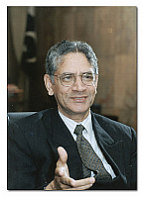A Pakistani perspective: Necessity for peace has never been greater
Published in the Peoria
Journal Star on January 25, 2004
The leaders of India and Pakistan, who met on the sidelines of a recent summit of South Asian countries, are once again talking peace. But to carry forward the dialogue, they need to bring the policies in line with their aspirations. And they need to be helped by the United States. Otherwise, the ground realities will soon overtake the rhetoric, and we may see a false start to yet another peace move in the region. It has happened often before. September 11, 2001, and the U.S. re-engagement with Pakistan as part of the war on terrorism, as well as India's diplomatic and military pressure on Pakistan, have no doubt played a seminal role in prompting Pakistan President Pervez Musharraf to bend his position. Pakistan is finally realizing that it had overstretched strategically by following a forward foreign policy in the region for which Pakistan, and indeed the world, paid a heavy price. The majority of Pakistanis are becoming painfully aware that the military's ambitions in Kashmir and Afghanistan complicated the search for solutions to the country's problems. These ambitions shortchanged the political process and contributed to the growth of religious militancy. Pakistan's stability was further strained by poor governance. President Musharraf now gives hope for change. The moderates in the Indian leadership, led by statesmen like President Vajpayee, have grasped the significance of the historic change underway in Pakistan and of the risks and opportunities in developing an appropriate response to it. They probably realize that a continued hard line by India will subvert this process of change. It is true that Musharraf needs to make the reform agenda enduring, but he cannot be pushed too far. If he is seen as too conciliatory to India, this will isolate him domestically, stoke the nationalist sentiments and raise the profile of religious parties. He needs space to realign political forces in the country and solidify a coalition of moderates and liberals. Musharraf has already come a long way in his search for peace, but the remaining ground cannot be covered without India's cooperation and U.S. engagement. The issues involved are not local and regional, but global. And at stake are not only the India-Pakistan relations but also U.S.-Pakistan relations crucial to the success of war on terrorism. South Asia has been changed by the post-Cold War world, its nuclearization and the September 11 attacks, and so has the basis for the United States relationship with it. The United States now considers its relations with both India and Pakistan as important. Whereas with India the U.S. seeks a broader economic and strategic relationship, with Pakistan it seeks influence to effect changes helpful to its interests in South Asia and beyond. Pakistan is a crucial partner and a target in the war on terrorism that affects both U.S. security and Pakistan's stability. An unstable Pakistan fosters militancy, endangers its nuclear assets, raises the potential for conflict with India over Kashmir and threatens its own internal cohesion. But the success of so much that the United States does in Pakistan and Afghanistan in its war on terrorism would require India's help in normalizing its relations with Pakistan. In the growth of extremism in Pakistan, India has been a problem (in Kashmir) but could now be part of a solution. India and Pakistan must make a serious effort to find an enduring solution that meets the legitimate aspirations of the Kashmiri people and satisfies their respective national interests. The United States is cognizant of the importance of the moment. That is why it is believed to have played an important behind-the-scenes role in facilitating the India-Pakistan dialogue. Signs are that the realization of the necessity for peace has never been greater in the region. And the ground realities are also ripe for change. So this peace move between India and Pakistan may be for real. Touqir Hussain is a retired Pakistan diplomat who served as ambassador to Japan from 1998 to 2003. Earlier he was diplomatic adviser to the prime minister, taking part in some of the early talks between leaders of India and Pakistan. He moved to Peoria a year ago to be with family, and writes on international affairs for leading Pakistani newspapers.
| 


